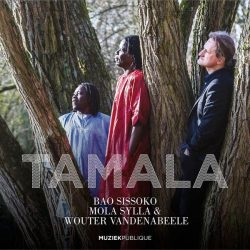 (5 / 5)
(5 / 5)
There’s a mesmerising and immensely calming quality to the material found on this joyous trip to Senegal and Belgium, and this welcomed introduction to three world class musicians.
Kora player Bao Sissoko and fellow Sengalese artist, singer Mola Sylla, team up with Belgian violinist Wouter Vandenabeele to craft a beautiful album of versatile World Music sounds.
Tamala means “travellers” and brings the trio back together after they worked on the albums “The Music Of Issa Sow” and Mami Kanoute’s “Mousso Lou” a few years ago. The chemistry between them is rich, and the tapestry of sound they weave with the voice just as much an instrument as the kora and the violin, is as warm as the Sengalese sunshine.
They veer seamlessly between tradition and innovation, strength and subtlety, dream and reality, north and south. Bao is hailed as one of the best kora players around today, a true master of this West African harp, he has played alongside the great Baaba Maal and is known for his collaboration with Malick Pathe Sow.
Mola sings straight from the heart, with an earthy tone and is acclaimed for his long-term work with Dutch cellist Ernst Reijisiger, with whom he composed the soundtrack to Werner Herzog’s film, “The Blue Yonder”. Mola also plays the xalam, a West African lute, the kongoma and kalimba (thumbed pianos) and percussion.
Belgian folk violinist Wouter, has a varied background of collaborations. After working with the Syrian oud player Elias Bachoura and taking part in the world-folk big band, Olla Vogala, Wouter is now injecting his infectious energy into this accomplished trio.
There are a dozen cuts here, offering up a total of circa 65 minutes of music. Levent Yildrim guests on Derbura (drum), all titles written by all or some of the three guys. An audible bond and mutual respect marinated into every little nuance and note. Each time I have given this disc a spin, I break out into a spontaneous smile. It’s infectious and the only cure might be to listen some more!
Recorded at The Moliere in Matonge, the African neighbourhood of Brussels, Belgium; a 400 seat venue. The record label they are on is part of a not-for-profit outfit that helps folk and world music artists through concerts, courses and projects, based in Brussels.
The songs all trace life and nature. The opener “Salubrite” invites us to think about and respect nature. City folk need to focus more on the impact they have on their environment, the earth, the air, flora and fauna, so says this song.
Mola pays tribute to all mothers in the world who guide their children with strength, courage and devotion; and the love born through pain and self-sacrifice, in the second track, “Kure Ndey”.
“Fode” may well be the very first song to pay homage to a wrestler! Senagelese wrestling champion Fode. That sport is huge in Senegal, and apparently drives crowds wild all over the country. Fode combats protests from the other side when he beats an opponent, by sitting on them for a photograph while they are out cold!
There’s a pleasing instrumental at fourth slot here, “Ceppe”, dedicated to a charitable organisation that Tamala has supported for several years. Their mission is to offer training in technical skills, hairdressing, IT, sewing etc, to street children of Dakar.
Mola and Bao penned the tribute to Bi Kidude, “Zanzibar”, the melody of which they first played in Zanzibar with the legendary Taarab singer Bi Kidude, who died in March 2013. The song tells the tale of an explorer who sets off to discover the universe, but he loses his way and finds himself destitute, starving and thirsty. Guided by the violin and the kora, he catches sight of the stars in the distance, is attracted to them and asks to remain close to them for the rest of his life. Bi Kidude now one of those twinkling stars…
Other topics among the rest of the material focus on the sea, 19th Century Senegalese history and families that have supported the development of numerous schools that have enabled children to receive moral, spiritual and cultural education and respect for others, peace and humility.
They also dedicate a song to all the people who suffered from slavery, and there’s a song sung in Sousou language, which tells the story of a star-struck lover;waiting to meet up with his sweetheart and listening out for her footsteps, wondering if she will turn up. Now I want to know if she did turn up or stood him up?
“Ayo Nene” is not based on the river in Northamptonshire! It is inspired by a nursery rhyme, and the word “Ayo” symbolises the movement of a crib of the baby “Nene”. The mother has gone to market to get food, the father is working, “but don’t cry, baby, I am singing this song for you until they return”. The closer, “Poulo” is sung in the Pulaar language, and is the story of the Fula people. Nomadic pastoralists found across the Sahel region.
I thought I would miss the sound of the electric guitar so often found on most World Music releases, and the sound of which I really dig. But I didn’t. Not once. These organic instruments, the stripped down and simplistic nature of this recording, the trio’s natural exuberance and that ethereal/passionate voice blends together to create a gorgeous ambience.
It takes us away from the here and the now, transporting one to far away lands, and the heat and tranquility that many of us crave outside of the summer months. It’s all here, bask in it…..
By Simon Redley
 (1 / 5) ‘Dull Zone’
(1 / 5) ‘Dull Zone’ (2 / 5) ‘OK Zone’
(2 / 5) ‘OK Zone’ (3 / 5) ‘Decent Zone’
(3 / 5) ‘Decent Zone’ (4 / 5) ‘Super Zone’
(4 / 5) ‘Super Zone’ (5 / 5) ‘Awesome Zone’
(5 / 5) ‘Awesome Zone’

















Recent Comments